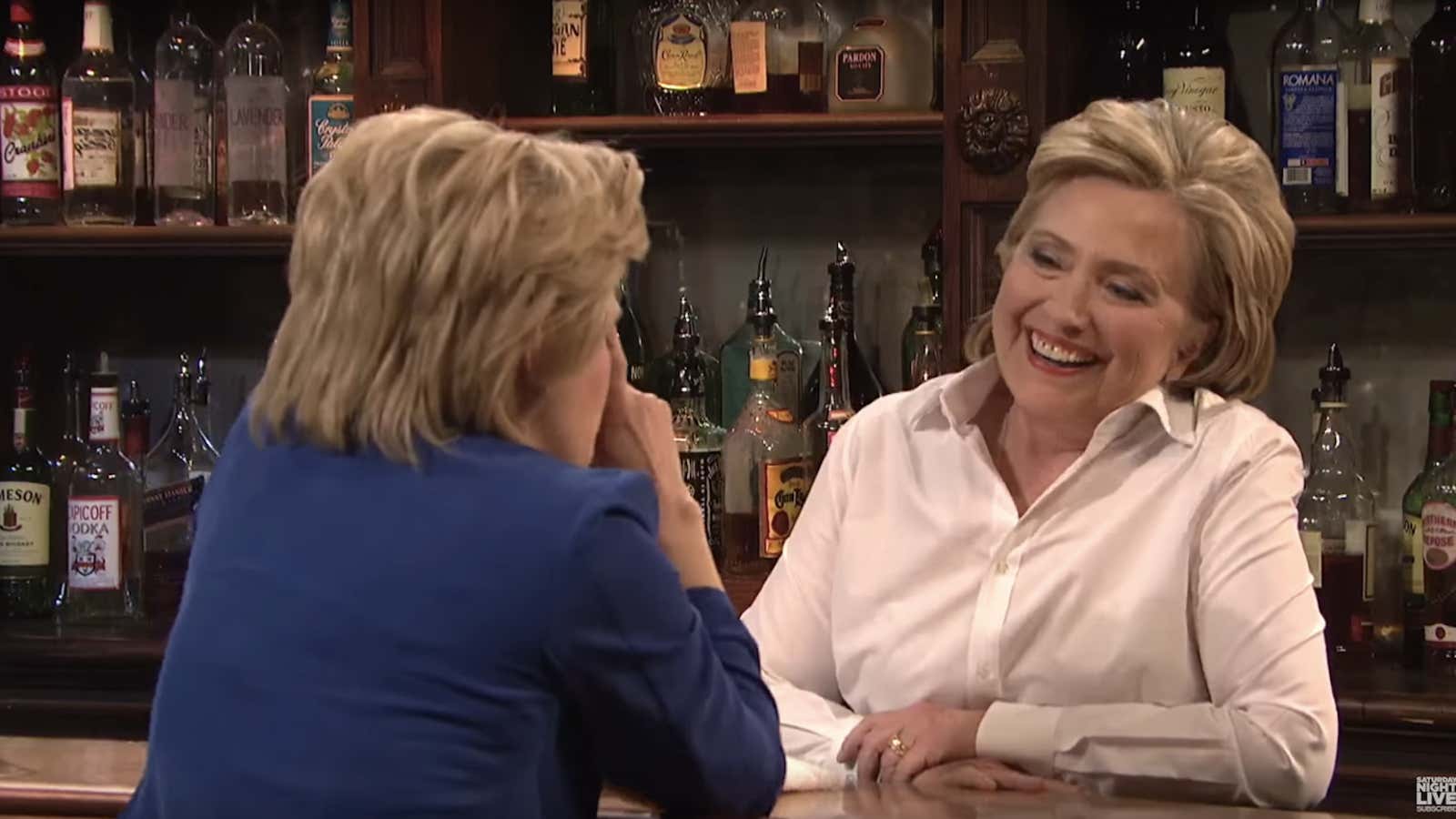Hillary Clinton would like Americans to know she’s very likable. No, really.
Over the weekend, the two-time Democratic presidential candidate appeared in a Saturday Night Live skit as an average Joe bartender, serving drinks and shooting the breeze with fake Hillary (played by SNL cast member Kate McKinnon). The skit was the latest attempt by Clinton to show her “humor and heart” to voters. In the bit, she impersonated Donald Trump, poked fun at herself, and even joined McKinnon in a rousing rendition of “Lean On Me.” But did it work?
The likability complaint has dogged Hillary for the better part of her public life. During husband Bill Clinton’s first run for governor in 1980, Arkansas voters disparaged her for being the independent, career-oriented Ms. Rodham instead of wifely, deferential Mrs. Clinton. (She subsequently took her husband’s name.) Recently released White House documents reveal that a decade later, her staff strategized to make her more “likable” mostly by making her appear softer and more feminine. During the 2008 campaign, the word surfaced again: Obama quipped that Hillary was “likable enough.”
Indeed, the question of Hillary’s likability is becoming more and more absurd, especially when you consider her credentials, arguably the most impressive of any 2016 presidential candidate. Why is that when it comes to Ms. Clinton, the sheer force of her experience and intelligence just isn’t enough?
In our enlightened, lean-in age, the majority of Americans actually do accept that women are just as capable of being good political and business leaders as men. A Pew report from earlier in 2015 concluded that female leaders are perceived as indistinguishable from their male peers when it comes to qualities like intelligence and capacity for innovation—and actually outrank men in qualities like fairness, compassion, and willingness to compromise. But the discrepancy between what we acknowledge women can do and what we let them do—women are still only 19% of the House of Representatives and 5% of Fortune 500 CEOs—reveals a lingering problem: We know that they’re capable but, as the Pew report puts it, women still have to do more than men to prove themselves. They have to go above and beyond the standards to which men are held to demonstrate their competence; they have to try extra hard.
Hillary’s career is a case in point. She’s had a long and arduous climb to the top, not surprising for a woman in politics. And yet part of the reason she’s so disliked is precisely because she’s had to try so hard. While in someone else this might indicate persistence or strength (take Bernie Sanders, who’s served in Washington since 1990) critics dismiss Hillary as being overly ambitious, for “wanting it too badly.” (That last one is a particularly bizarre complaint: Whoever undertook the trials of a presidential campaign without really wanting it? Do Americans think Barack Obama was only casually seeking the highest office in the land?)
It’s a Catch-22, the political version of the Madonna-whore complex: Breaking a ceiling as high and as impenetrable as first woman president means trying really hard. But trying really hard begets a litany of often gendered criticisms—she’s not warm, she’s not funny, she’s not “likable.”
Perhaps the problem is that we still find female ambition vaguely distasteful. Intellectually, most Americans believe women are capable leaders; certainly, we know it’s what we’re supposed to believe. But emotionally, Americans still find the image of women in power hard to swallow, hence the higher bar for proving competence. And women’s struggle to gain power looks especially unseemly: As The Atlantic pointed out in September, it’s much more culturally acceptable to simply be a #luckygirl on whom fortune smiles sans blood, sweat, or tears.
Hillary’s problem is so persistent in part because it’s so visceral: What makes a candidate likable, anyway? It’s an odd word to describe an adult, especially a former Secretary State. And it’s clearly about more than just agreeing with their policies or being satisfied with their credentials. As another SNL skit earlier this summer highlighted, whether we view someone favorably doesn’t always have, or even require, a rational answer. In the skit, fake HRC (again, played by Kate McKinnon) approaches two children while “campaigning.”
HRC: Why don’t you tell your parents to vote for me, Hillary Clinton.
Kids: Aw, they don’t like you.
HRC: Why not?
Kids: I don’t know, they just don’t.
HRC: Well, what can I do moving forward to earn their vote?
Kids: Um, I think nothing cause they said they just don’t like you and, um, never will.
HRC: What a fun thing to hear for almost 20 years.
Ultimately, the irony of Hillary’s latest push to change her own narrative is that whether or not she actually is likable almost doesn’t matter anymore. At this point, whatever Hillary does looks like another variant of trying to be liked. She cannot escape the punishing lens of effort.
Perhaps then the onus is not on her, but on the media—and even the public—for whom the line between politics and entertainment has grown increasingly thin. Candidates aren’t treated as politicians so much as celebrity personalities, America’s dowdier versions of Kim and Kanye. Debates have devolved from serious political deliberation to a more civilized form of blood sport, which we watch (and dissect the next day) like Game of Thrones. Facts aren’t important so long as the candidate lied with aplomb.
It’s no coincidence that Hillary has sought to address the likability complaint by appearing on comedy shows and doing interviews with celebrity actors like Lena Dunham. Her experience and long history in the spotlight bore us. We want to be entertained. She wants to be president.
